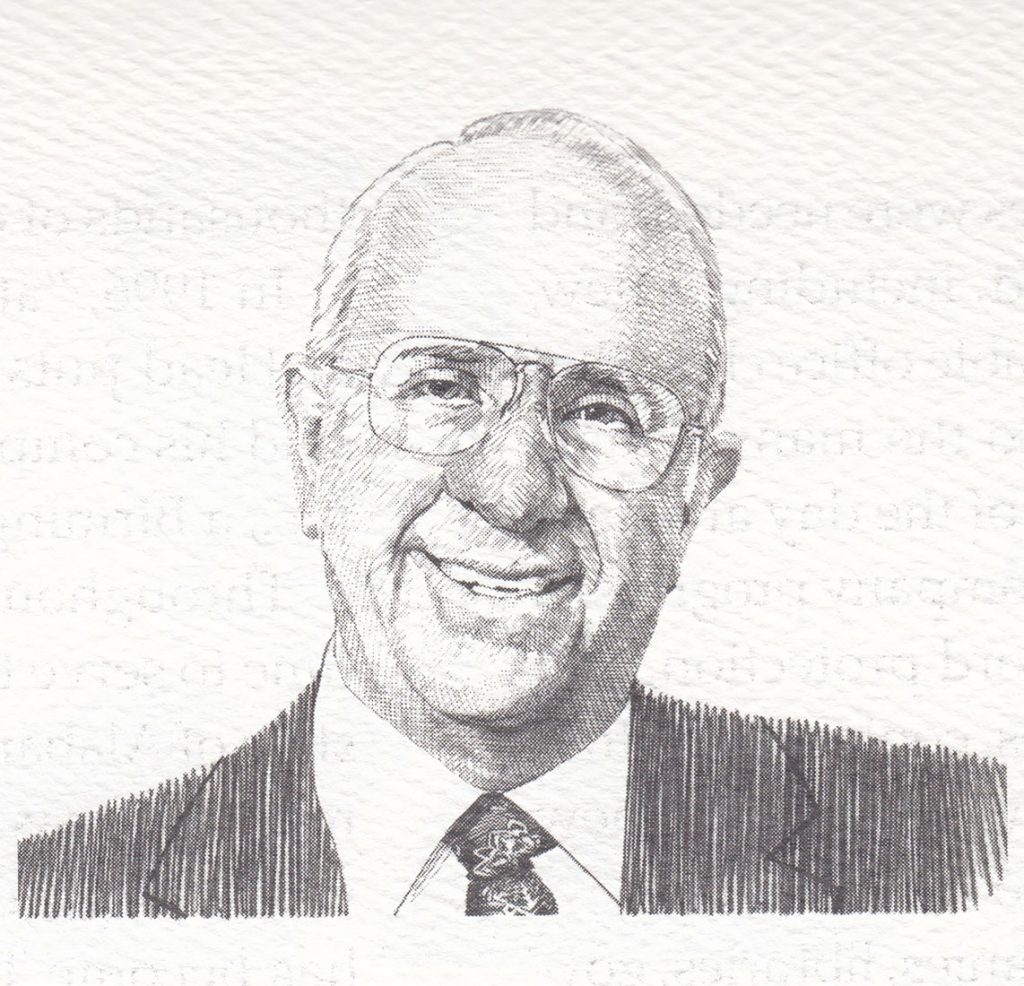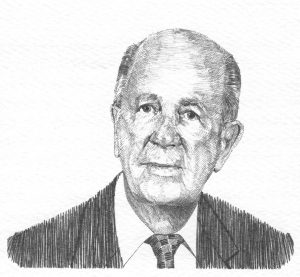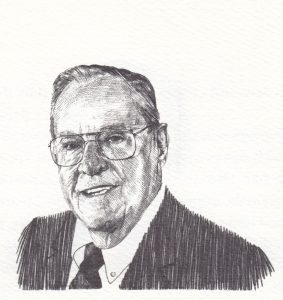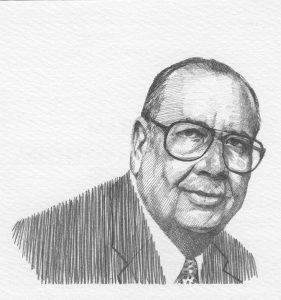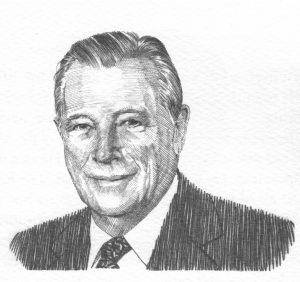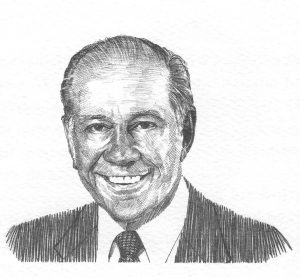Wallace D. Malone Jr. was born into the banking business. And he has made the most of it. Malone basically built SouthTrust Corporation, which he has essentially run since 1972. He served as president until 1981 when he was elected chairman and chief executive officer. Over the past 29 years, SouthTrust has grown into one of the nation’s premier financial organizations.
His family entered banking over 100 years ago in one office in the heart of Dothan, Ala. The family bank, the First National Bank of Dothan, was chartered in 1900 by Malone’s grandfather with $50,000 in capital and $75,000 in deposits. That same bank is one of two forerunners of SouthTrust, now a $64 billion bank holding company – the largest financial organization in Alabama with the largest market value of any Alabama corporation.
Malone was born August 3, 1936, in Dothan, the son of Wallace D. Malone Sr. and Alice Mae Dee Malone. After graduating from high school in 1954, he enrolled at Alabama Polytechnic Institute (now Auburn University). After one year, Malone transferred to The University of Alabama where he received his bachelor’s degree in business in 1957. Upon graduation, he worked for a small bank in Enterprise, Ala., for about a year. His first duty was to post the bank’s general ledger with pen and ink and to get the ledger in balance with a hand-crank adding machine. In 1958 he left Enterprise to pursue an M.B.A. degree at the Wharton School of Business at the University of Pennsylvania, and he earned that degree a year later. In June of 1959, he returned to Alabama and joined his father in the family bank. When his father died in 1968, Wallace D. Malone Jr. was named chairman and chief executive officer of the First National Bank of Dothan.
In 1996, The Birmingham News named Malone “CEO of the Year” and described him as “relentless, shrewd and fiercely competitive.” Those attributes have served him well in a lot of bank and industry battles over the past 40-plus years.
The last three decades have witnessed dramatic changes in the banking industry, and Malone has been in the middle of those changes. In 1972, the first holding company was introduced into Alabama, which Malone and several banks opposed. One of Malone’s allies was Guy H. Caffey Jr., president of Birmingham Trust National Bank. When the Federal Reserve Board approved the formation of holding companies in Alabama that year, Malone told Caffey, “Since we can’t fight ’em, we’d better join ’em and we’d better be quick about it.”
Malone and Caffey then decided to organize SouthTrust. By the end of 1972, South Trust had acquired a bank in Mobile and a bank in Huntsville. SouthTrust had less than $600 million in assets at that time. In January of 1981, Guy Caffey retired, and Malone was named chairman and CEO. SouthTrust’s total assets by then were $1.8 billion.
Malone has been recognized repeatedly for his strong leadership of SouthTrust. His intellect, his ability to laugh at himself, his compassion, and his ability to focus on the job at hand has been documented many times.
In introducing Malone at a Newcomen Society meeting some years ago, former president and chief operating officer for SouthTrust, Roy Gilbert, told the following story:
“Every great leader that I have ever read about has demonstrated compassion. There is a lady who goes to my church who has cerebral palsy, but she still works and drives an automobile, although with some difficulty. She works in the SouthTrust Tower. One morning, Wallace followed her into the parking deck and noticed how difficult it was for her to get her card into the access box to open the gate. When he got to his office, he called me and asked me to arrange for her to have an automatic access opener for her car; and he said he would personally pay for it. I don’t think she ever knew where it came from.”
Malone’s compassion is equaled by his business acumen. He has built SouthTrust into a Fortune 500 company, with more than 680 banking offices in nine Southern states. With more than $47 billion in assets, SouthTrust is ranked among the top 20 banks in the country. The company has more than 12,500 employees, of whom a considerable number are shareholders.
A key strategy that initially set SouthTrust apart was the decision to enter only high-growth markets, in the belief that internal growth, not continuous acquisitions, was the best way to produce long-term, top-notch performance. Malone has been careful not to acquire banks that cannot match the company’s growth rate. And he has been careful not to acquire banks that dilute stockholder value. As for the concept that big is always better, cheaper, and more efficient, Malone has often said, “being big does not necessarily make you smart, and being small does not necessarily make you dumb.”
Malone has seen SouthTrust’s loan business significantly increase. In the beginning, the bank had slightly more than $200 million in total loans, of which only $40 million were commercial loans. SouthTrust now has more than $32 billion in loans, with more than $22 billion in commercial loans. Today, SouthTrust makes loans to a single customer equal to twice the amount of the entire commercial loan portfolio in 1972. Up until the economic slowdown that began in the middle of last year, SouthTrust’s loan portfolio was growing at $2.5 billion or more a year.
Stockholders have also done enormously well at SouthTrust. Stockholder equity, in the beginning, was less than $30 million, compared with $3.8 billion today. The bank’s net income was around $5 million in 1972, and it has compounded at an average rate of 19 percent per year in the 29 years since then. Today SouthTrust is earning at the rate of more than $500 million annually. Net income in 2001 will exceed the total assets of the initial organization.
Malone is a strong believer in the “SouthTrust culture” and in taking care of employees. Under his guidance, the company has developed one of the industry’s premier profit-sharing plans. “Take care of the employees and they will take care of you,” Malone says.
Malone’s management philosophy was outlined in a recent article: “You have to hire good, conscientious, intelligent people. You must give those people the benefit of receiving extremely good training. You must pay them well, you must keep them motivated and use pay incentives everywhere possible to reward performance. People, particularly those at all levels of management, need to feel that they have the possibility of upward mobility. Good people always want to improve themselves. Management must be perceived as fair with everyone. Sometimes you can be a rather strict manager if you are perceived as absolutely fair. You must do things when they ought to be done. You don’t do on Thursday what you should have done on Monday. You must understand that the customer is king. If you don’t take good care of your customers, you will wake up one day with no customers and no business.”
SouthTrust employees make 95-plus percent of the customer decisions at the market level Malone wants all customers to be called by name when they visit the offices and have a positive experience. He has often said, “All money is green, and you can get just about the same type checking account, CD, or loan at most banks. What really sets a bank apart from its competitors is its people. With nearly all types of businesses, the company with the best people almost always wins.”
Malone either serves or has served on a number of boards over the years, including Troy State University, Samford University, Baptist Health System of Birmingham, the Eye Foundation Hospital, the University of Alabama Health Services Foundation, UAB Health System, Business Council of Alabama, Alabama Healthcare Council, Economic Development Partnership of Alabama, Salvation Army Advisory Board, Public Affairs Research Council, Birmingham Area Chamber of Commerce, the Alabama-Florida Boy Scout Council, the Greater Alabama Boy Scout Council, the Federal Reserve Branch of Birmingham, and United Way. He is a member of the Rotary Club of Birmingham, the President’s Cabinet of The University of Alabama, the Culverhouse College of Business Board of Visitors, the Newcomen Society of North America, the Birmingham Business Leadership Group, and the Quarterback Club of Birmingham.
Malone is married to the former Ocllo Boykin Smith and they have six children and eleven grandchildren. He and his wife have traveled extensively, and he has skied and hunted on three continents.
Malone has been involved in many diverse, non-business activities that include tennis, golf, hunting, fishing, water and snow skiing, scuba diving, skeet shooting, flying (he earned his pilot’s license in 1955), archery, building cars, chess, and bridge. He truly is a man for all seasons.

